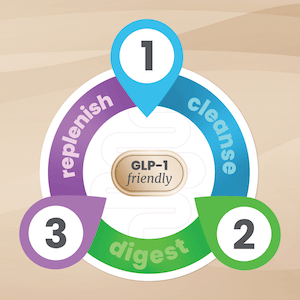You’ve committed to being healthier in the New Year, now what? Eating healthy and getting regular exercise are the main part of your game plan, but you may be missing an important part of the equation: a healthier gut.
It turns out that when you have a healthy gut, it may make it easier to maintain a healthy weight. A healthy gut = a digestive system that flows smoothly, processing food properly so the body can get enough nutrients, has a balanced mix of microbes or bacteria, and gets the waste out regularly.
What the Science Says
You’ve probably heard a lot about the gut recently. That’s because the National Institutes of Health created a Health Human Microbiome Project—the largest study of its kind dedicated to the human gut. In this years-long research, top scientists from around the world discovered that there were thousands of strains of bacteria in our digestive system that have powerful effects on our health.
Here’s more about what scientists have found:
How to Keep Your Gut Healthy
There are many simple things that can help keep your gut healthy—and balanced. Here’s where to start:

✓ Address Constipation issues. If your digestive system isn't regular, and you suffer from constipation, bloating, and feeling heavy, you should address this as soon as possible. Supporting the short term cleansing and detoxification of waste may support the long term health and function of the intestines and microbiome. While cleanses are not meant for everyday use, they may allow you to reset and give you the opportunity renew your regularity with longer term solutions.
Try MagO7, our natural colon cleanse to reset from constipation and bloating.
✓ Choose whole foods over processed foods. Fresh fruits and vegetables, whole grains, lean proteins, healthy fats, and nuts and seeds help make up a healthy diet that’s good for overall health, as well as for maintaining a healthy weight. Not only is a whole foods diet rich in nutrients like fiber, it also supports healthy digestion. Processed foods, on the other hand, are typically high in sugar or fat—which can affect the makeup of bacteria in the gut.
- If you don’t get enough fiber, gut bacteria don’t have what they need to survive—or thrive. Gut bacteria feed off of fiber, and more specifically soluble dietary fiber. While fiber-rich fruits, vegetables, whole grains, and legumes are optimal sources of fiber, getting enough of what you need through food isn’t always realistic.
- That’s why our Daily Multi-Fiber is an effective option. Not only does it have both soluble and insoluble fiber and prebiotics, it also contains 1 billion CFUs of bacteria (this is a measurement of bacteria in a product). Try Our Daily Multi-Fiber in new Savory Mocha
- Water helps in the proper digestion of food—and is critical to keeping stools soft so you can get rid of waste regularly. According to research, drinking plenty of water is also important to support good-for-you bacteria in the gut.
Bottom line: by taking care of your gut, you’re supporting your New Year’s resolutions—and you’re also making an investment in your overall health.


















